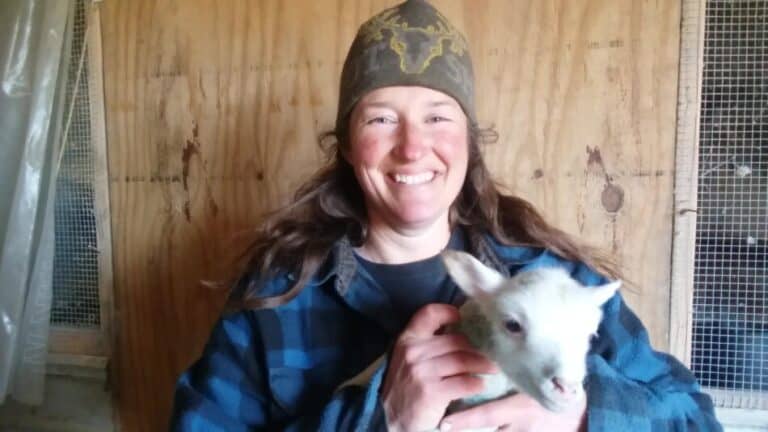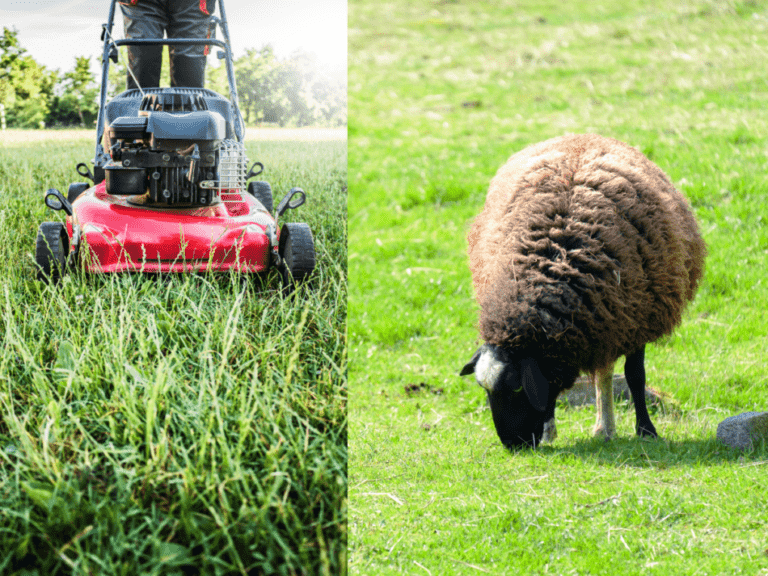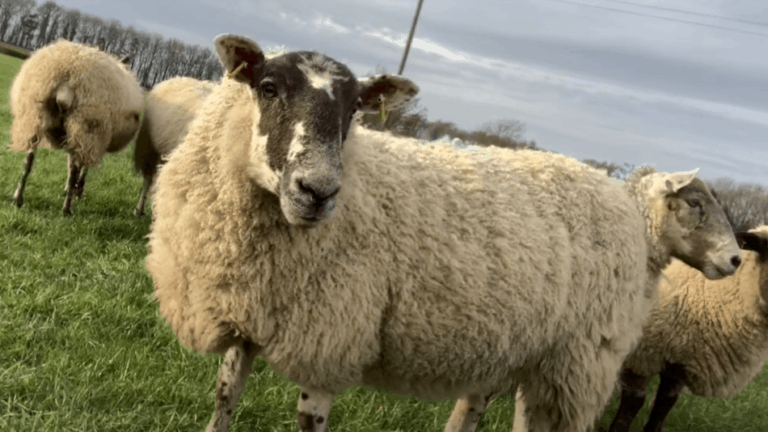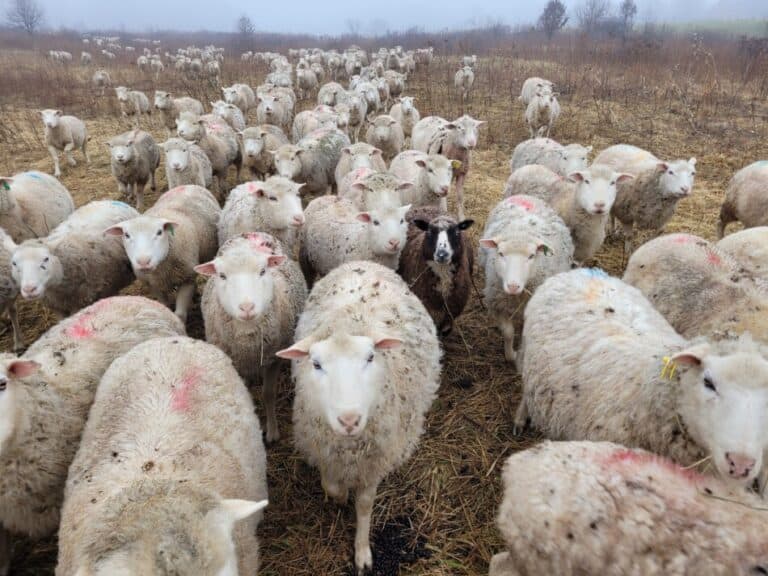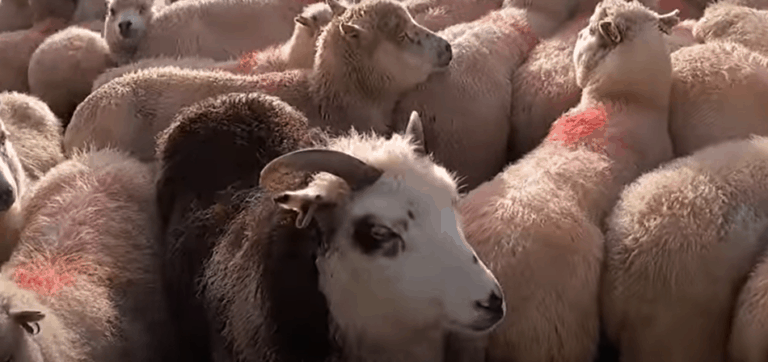Sheep Or Goats: Which One Should You Raise?
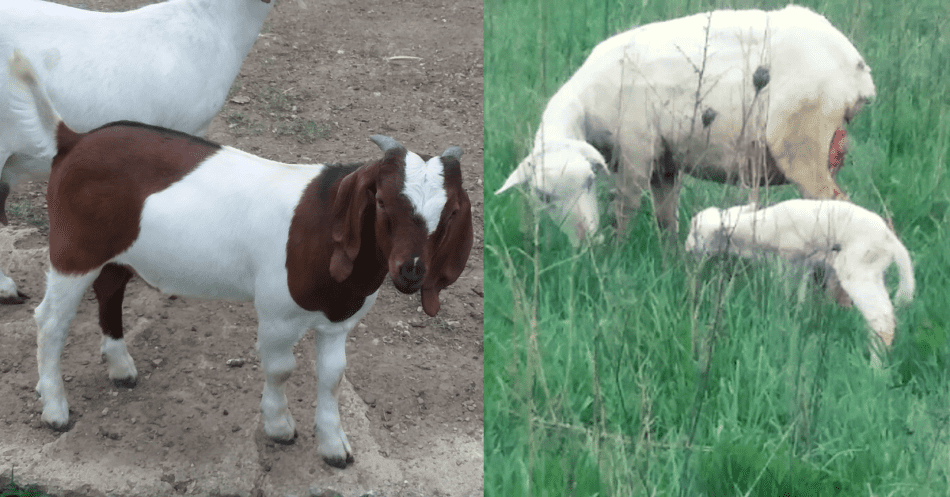
Should you raise sheep or goats? It’s a big question for a small livestock owner.
Sheep and goats, despite being close to the same size, are very different in how they interact with people. Let’s look into which one (or both!) will suit you and your farm better.
While sheep and goats are both small ruminants, they differ in management needs and the environment to which they are best suited. Sheep do best in areas with plenty of grass and don’t mind damp weather conditions, goats like to browse and need to be dry.
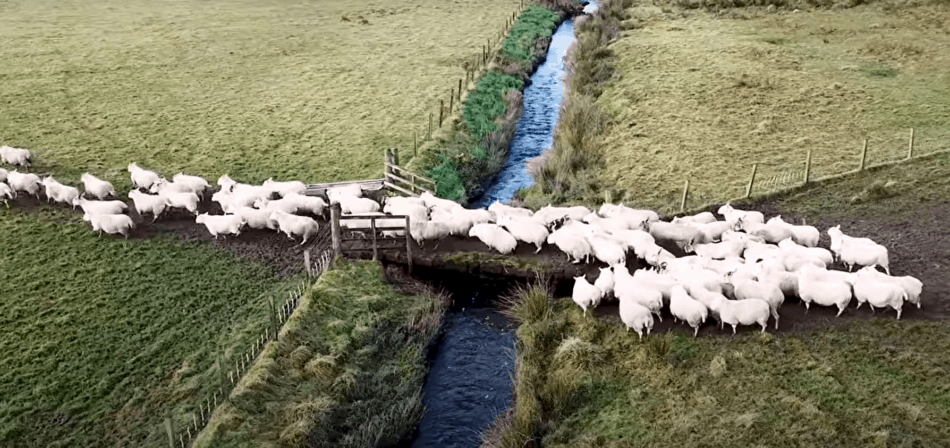
Here’s the short version:
Sheep– graze, are easier to control, not likely to be your buddy.
Goats-tons of character, foragers, more pet like, escape artists.
Hoping for a bit more of an explanation? We’ll just get right into the comparisons (so you can figure this our for yourself).
| Trait or situation | Sheep | Goats |
| Grazing your lawn | Yes | No |
| High value meat | Yes | Yes |
| Has personality | No | Yes |
| Easy to fence | Yes | No |
| Love to browse | Maybe | Yes |
| Handle the heat | No | Yes |
| Handle the cold | Yes | No |
Raising sheep for high demand meat
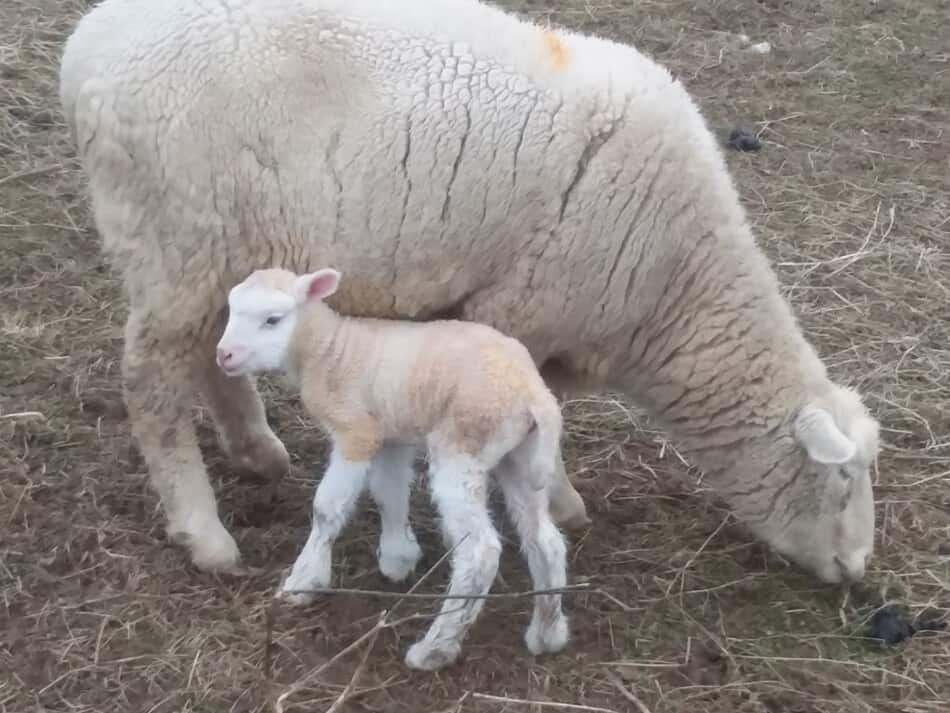
The best things about raising sheep
- Eat grass
- Efficient use of feed
- Easy to contain
- Respectful of property
- Need less shelter in the winter
Sheep eat grass and do not need other feed
If you have grass to be eaten, sheep are the better grazer of the two.
Sheep happily live on grass or other forages alone, with water and a salt block in the field, too, of course.
How Much Are Lambs Selling For? shows you how to find current market lamb prices in your area.
Sheep are more efficient in their use of feed
We have noticed that sheep tend to grow more on the feed they are given than goats.
I have to admit, it could be because sheep are not as shameless about wasting hay as goats are.
I have no data to back this up (sheep growing more for the feed/hay given), this is just what we have seen on our farm.
Sheep are easy to contain
Sheep are much easier to fence than goats.
You can get a few sheep that insist on getting out or jumping into an area where you don’t want them, but just a few.
With goats, it’s all of them wanting to get somewhere else.
ElectroNet 9/35/12 For Sheep is an article I wrote to show you the good side and the not so good side of using netting as fencing for sheep.
Sheep are more respectful of property
Sheep are just much less “adventurous” than goats so they tend to live a more sedate, not dancing around on the top of your car, life.
Sure, sheep will get out if they see an opening in your fence, but for the most part they are okay with where ever you have them as long as the have grass.
Backyard Sheep shows you how to fit sheep into your smaller acreage livestock plans.
Sheep need less shelter in the winter
Sheep do not need to come into the barn as much as goats. Sheep have no problem handling the cold.
They don’t like to be wet, but they can handle it better than goats. This is due to the insulating ability of the sheep’s wool and fat.
The worst things about raising sheep
- Tendency to overreact
- Predators
- Never get super friendly
Sheep tend to overreact
Sheep do have a tendency to overreact. There is no getting around that.
Normally, this isn’t a big deal they just run away from the “threat” and go back to grazing once they feel safe.
Where this can become a problem is in the heat or with really young lambs.
In the heat, when something catches their eye and they run away, they are much more likely to have problems with heat stroke.
Even if what ever scared them isn’t predatory, they still skitter away- and end up getting hotter on an already hot day.
When young lambs are involved, they get confused and “lost” or even stepped on quite easily.
If the main flock runs the littlest ones get left behind. They will find their moms again, that is just extra stress on an animal that does not do well under stress to begin with.
Disadvantages Of Sheep gives you the straight scoop on the not so great aspects of sheep.
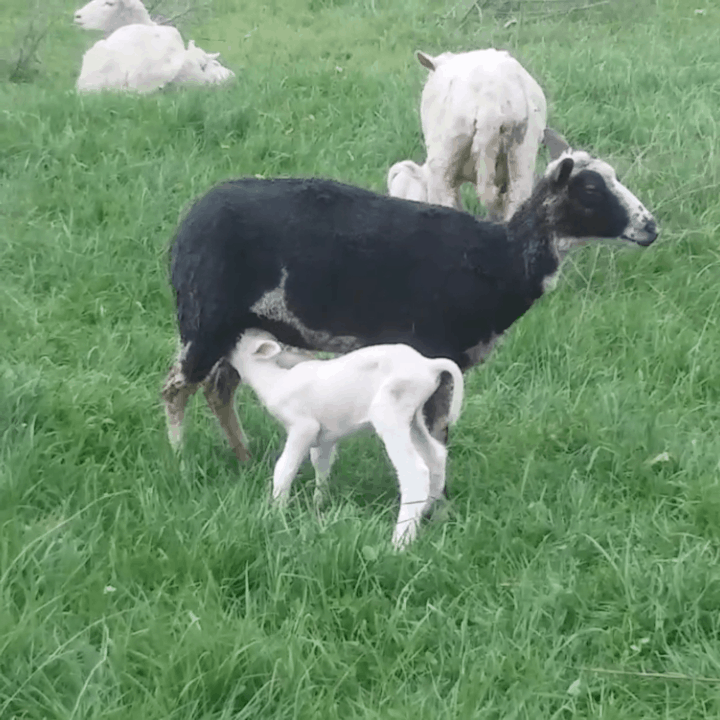
Sheep are prone to predators
Sheep can be a predator magnet.
We keep our new lambs close to the barn the first few nights, which seems to fix the majority of the predator problems.
The black vultures have started showing up the past few years, and they are more of a persistent problem, especially for young lambs.
Regular vultures, the bald headed ones called turkey vultures, are not a threat to your sheep, since they only eat decomposed carcasses.
The black vultures, on the other hand, will kill smaller animals like lambs or calves in order to eat fresh meat.
Since lambs are small to begin with, they are an easy target.
Sheep never get super friendly
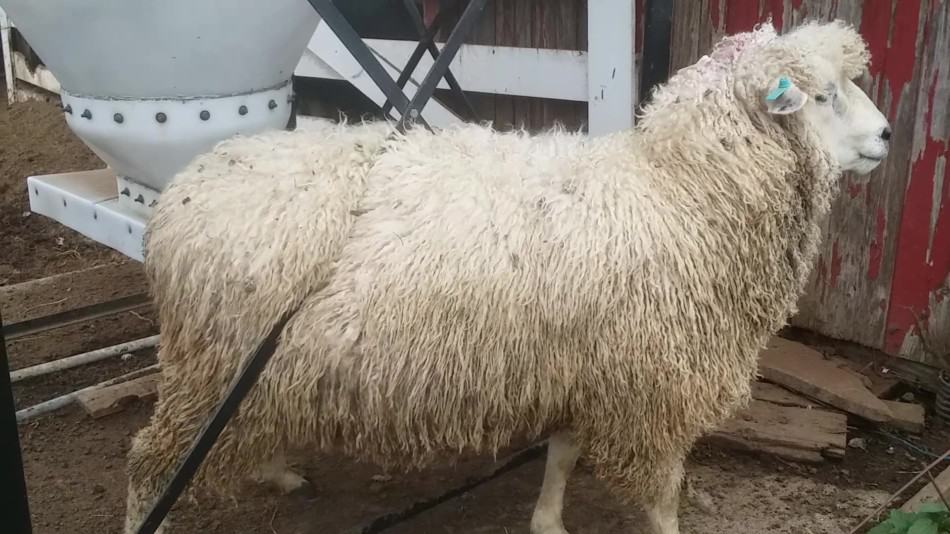
Sheep will never be as friendly as goats.
In all the years that we have had sheep, we have only had one that was very friendly, a Cotswold ram.
All of the other sheep we have or have purchased would prefer to keep some distance from people, unless of course, you have a feed bucket!
Even sheep that are handled a lot, are not likely to be overly friendly. This is just their nature.
The exception here is a bottle lamb. Bottle lambs are unusually friendly, but that is because they were raised by a person, not a ewe.
Even bottle lambs will get less and less puppy like as they grow.
Things you might not know about raising sheep
- Not a lot of vet help
- You can transport them yourself
- Hair sheep are an option
There is not a lot of vet help for sheep
There is not much veterinary help available to the sheep owner. This is not a fault or lack of caring on the part of the vets, there is just not much help to be given.
Aside from deworming, sheep do not respond well to treatment, this is just their nature.
Of course they still need treated when they have a medical problem, I’m just pointing out the likelihood of a great recovery is slim.
You can transport sheep yourself
You can haul sheep yourself. We see people make all manner of racks or portable hutches for the pickup bed to take their sheep to the auction.
Some people just put together a few cattle panels in the truck and it works great.
Livestock that have more power, like cattle or pigs, need a tougher containment pen, but sheep are different.
As long as the sides of the pen are high enough for them to stand up (I’d put a top on it as well) your transport pen can be very basic.
I’ve even seen people use the big dog kennels in the back of an SUV.
Obviously, this would be just for a few lambs, but still doable for most people with their own vehicle or one that is easily borrowed.
Hair sheep are an option
If you are interested in sheep, but do not want to deal with the wool, consider hair sheep. Hair sheep are becoming much more popular lately. They are at the auction every week, in our area of Ohio.
Be aware, we have noticed a difference in prices paid for hair sheep market lambs compared to wool sheep market lambs.
The hair sheep seem to bring $0.20-0.25 less per pound at the auction. We are not sure why this is happening, but it seems to be the case whenever we watch the sale.
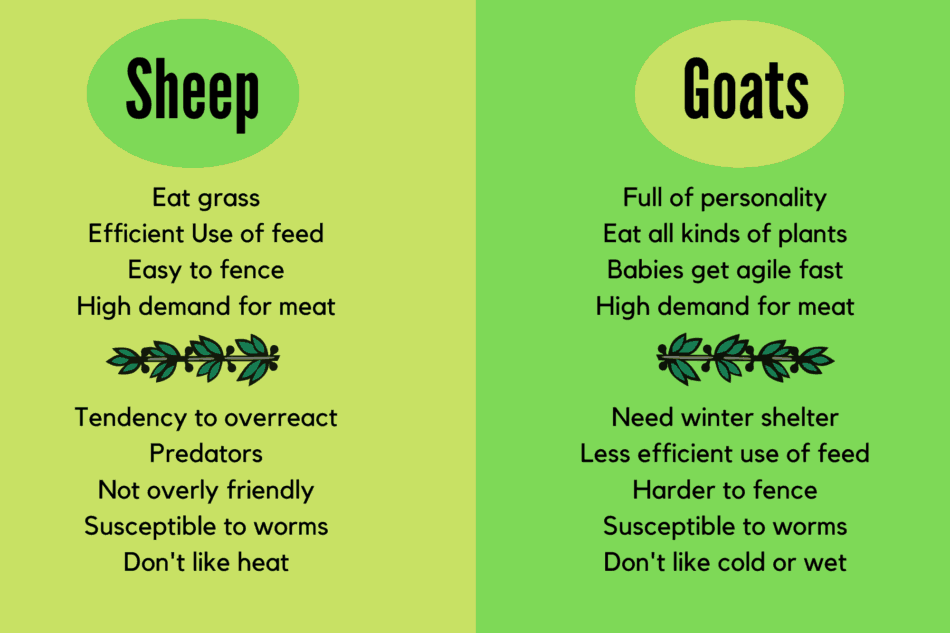
Raising goats for high demand meat
The best things about raising goats
- Personality
- Love to eat all the plants most other animals won’t
- Babies up and going smoking fast
- Meat has high demand and low domestic supply
Goats have personality
Personality is the biggest difference between sheep and goats. Goats are all about personality.
They come right up and make you notice them and are always on the alert for when you come around, in case there is something going on that they need in on.
Sheep notice what you are doing and watch in case you are bringing out snacks but all from a safe distance.
A goat will be right up on you and investigating the situation for herself.
Best Things About Raising Goats is an overview of the fun parts of keeping goats.
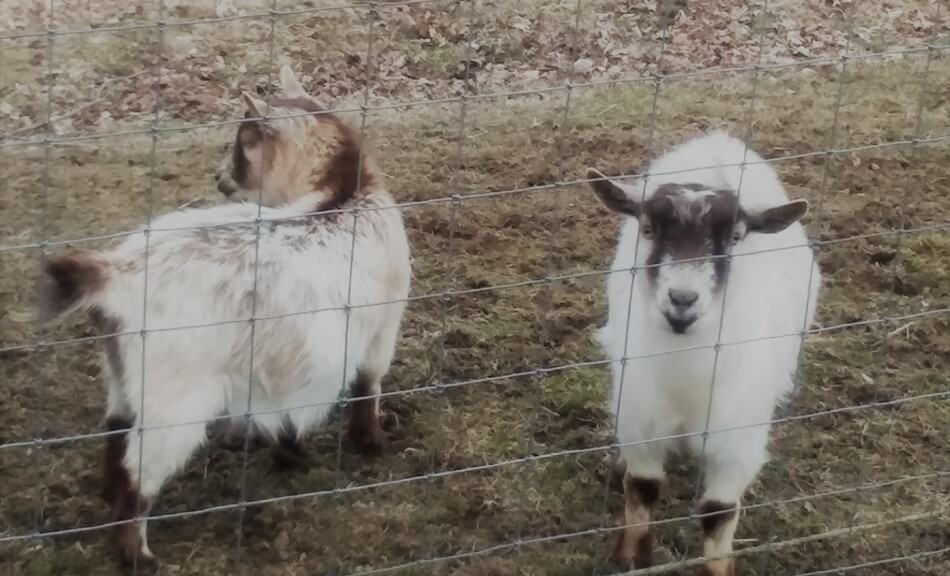
Goats love to eat all the plants most other animals won’t
Goats love to nibble on nearly anything that they can reach.
When we got Scout, our newest goat, the first thing she ate in the pasture was some dock seed heads. Not the grass, she went straight for the weeds.
Goat babies up and going smoking fast
Rose, a Boer goat we got last spring, had her babies on June 29 in the early morning, right at sunrise.
They were up and going really fast. (To be fair, the good lambs are this way as well.)
But the real show stopper was how agile those kids were in 2-3 days.
At this age lambs would still be pretty awkward, but those baby goats developed coordination and goat level daring, super fast.
Goat meat market has high demand but low supply
The demand for meat goats is higher than the supply, both locally and nationwide, and it looks to be staying that way, at least in the near term.
Click here to read my article on how to read a market report to figure out the prices in your area. (It’s written for cattle, but it will still help you, the math is the same for any meat animal that sells at auction.)
The local farmers looking to raise profitable small livestock, mostly Amish getting out of dairy, are going towards sheep, not goats.
If they switch to goats, then the demand for market kids for the area will be likely be met, meaning price will go down.
Until then, goats still have lots of room to expand here.
In our area, the goat meat market is doing well right now and seems to be holding steady, if not inching up a bit.
I would expect a 60 pound goat to sell for $120-150 on a normal auction day. (Higher before a holiday that is celebrated with goat meat.)
Any of the budgets I read for meat goats have the market kid prices set much lower, so be sure to check out your local prices!
Here is a link to Penn State’s meat goat article that includes a budget PDF. (This is the best meat goat budget I have found so far.)
The worst things about raising goats
- Goat attitude
- Seem to take more feed
- Not a lot of commercial goat information available
- The billy/buck stinks!
- Love to eat landscaping when they escape
Goats have an interesting attitude
This is the make or break section for goat ownership.
If you love tenacious, you can’t get me down, in your face attitude coupled with scary good agility and thinking, then goats are definitely your choice!
Here are some examples of goats being goats: jumping into the open hatchback of a visitor (true) or scampering up on top of a car and pooping up there, the babies this time (another visitor, also true).
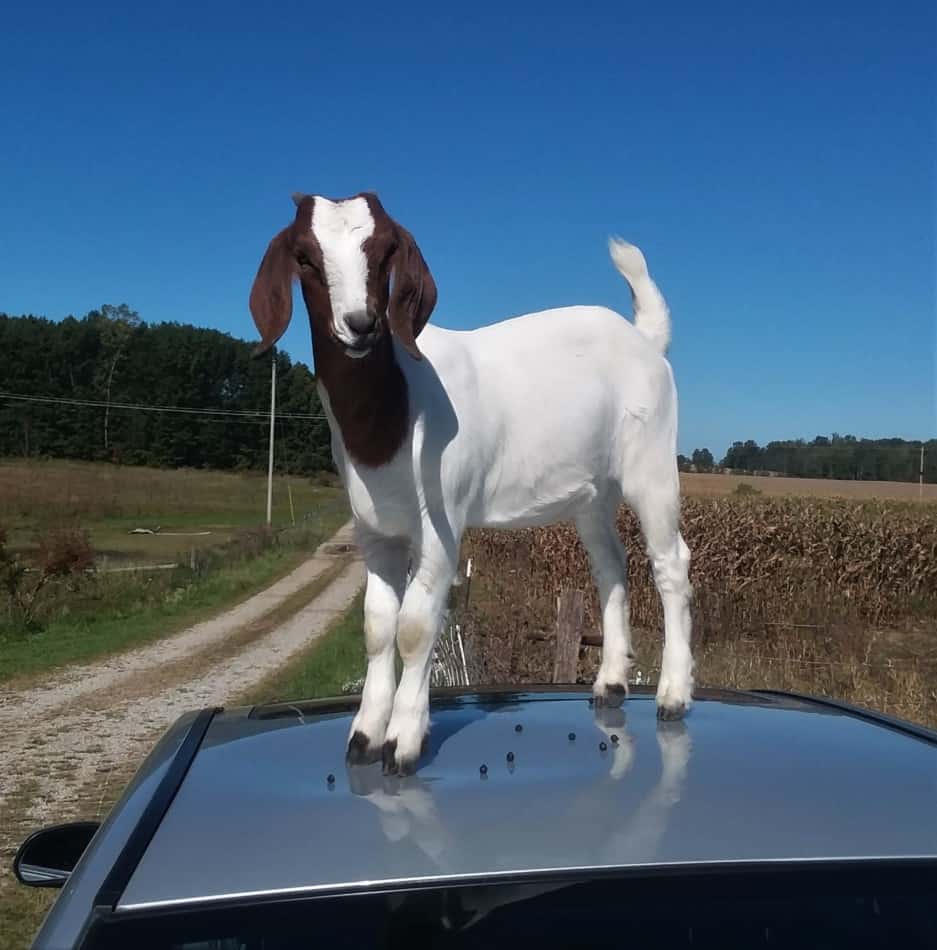
If you want a small herd of stock that behaves themselves, quietly eats the grass and hardly ever “pushes” your patience, do not get goats!
Goats seem to take more feed for the same gain
I have no data to prove this, just what we have noticed here. Goats seem to take more feed, hay, whatever they are eating than sheep.
It could be that they are super good at pulling the hay out of the feeder and wasting it. So they aren’t really eating it, just stomping on it.
Either way, I paid for it and gave it to them, yet the hay didn’t go towards filling them up.
Any information I can find online seems to put goats and sheep at the same level as far as feed needed per day.
Not a lot of commercial goat information available
Over the past few months, I have been trying to get a good idea of what raising a commercial herd of goats could do for us.
Would they work well with the sheep (that we already have) or compete with them?
How much hay, vet care, etc. should I plan in to the figures to see how the profits, or lack of profits, turn out?
It shouldn’t be hard to find this information. Yet. I look around, in print and online and get mostly show goat or pet goat focused articles.
Nothing wrong with either of those ideas, that’s just not what I need.
It only makes sense to figure out an initial budget for a small commercial herd of goats, since I am looking at adding an additional income stream to the farm.
That takes numbers, based on common sense commercial production, that, so far, are not easy to locate.
The breeding bucks stink!
We’ve had a few different bucks, both dairy and meat type, and all of them stink! Really stink.
It’s a smell that sticks with you and is near impossible to get off your clothes. Kind of reminds me of skunk smell, in the staying power (not the specific smell).
I was always concerned that a buck would be mean, you know like the reputation of them head butting anything that moves. For us, not the case.
All but one were friendly, too friendly. They wanted to be petted but I didn’t want to smell!
The exception to the friendly part was a Kiko that just didn’t like to be close, he acted more like a sheep in that regard. He wasn’t mean, just not friendly.
We do know a small herd goat raiser who sold his beautiful spotted buck because of bad attitude, but we have never had that happen, so far.
Goats love to eat the landscaping when they escape
Goats seem to have radar that they use to hone in on your favorite plants and shrubs.
When they get out, you can bet they will head over to eat down the ones you like the most.
They are equal opportunity eaters, they’ll nibble on the non favorites as well (wouldn’t want to leave out any).
If you love your landscaping, keep your goats in a super secure pen or expect some landscaping casualties.
Things you might not know about raising goats
- Not a lot of vet help
- Can get breeds that are less able to escape
- Treat you more like a dog
There is not a lot of vet help for goats
Sadly, just like for sheep, there is not a lot of vet help available.
Once again, not on the part of the vet herself, on lack of knowledge and experience with goats for most large animal vets.
There are some small ruminant programs available, but most farm vets would have a large animal emphasis in their training.
You can get goat breeds that are less able to escape
If you’ve looked into goats, then you’ve come across some breeds that are much shorter than others and are currently very popular.
I think this is because they are easy to keep in when compared to the bigger goats. Examples would be Nigerian Dwarf and Pygmy.
I wrote an article about Nigerian Dwarf goats, which includes an interview with a local farm raising them. Check it out.
There are also the “fainting” goats to consider. They do not get out as often as other goats.
In our area, these goats are of the smaller, pet size, but there are full size “fainting” goats that are specifically bred to be meat goats.
Word to the wise, if you want the full size version, refer to them as myotonic not “fainting.”
Pet goat people use the word fainting, meat goat people use myotonic.
Goats treat you more like a dog treats people
For me, this is a big surprise, I didn’t grow up with goats. We got some because our daughter was interested in them.
Goats want to see you and come up to greet you, more like a dog, and definitely not like a sheep.
I didn’t know if this was just the behavior of the few odd individuals we have purchased or goat normal, but from what I have seen here, it is goat normal.
I just bought a Boer doe a few weeks ago and the first few days she liked us, my husband and I, more than the other goats!
Now she is hanging out with the other goats as part of the herd but is still friendly as all of them are.
Be aware, the friendliness of goats that I have experienced could be due to the breeds we have purchased, dairy and Boer so far.
The one Kiko buck never was overly friendly, but that is the only non Boer, non dairy goat we have had.
Be sure to ask the breeder about how the goats treat their person on a daily basis before you buy your first goats.
If you want the goats to be your buddies, make sure that is what you’ll get.
Sheep and/or goats is decided by you
First off: let me start by saying that we have both sheep and goats, so I can tell you from my experience on our farm what both are like in day to day needs and interactions with my husband and I.
Second point to note: their is not one best animal for everyone. The best animal for you depends upon you, your situation, your management and your facilities.
Applying this to sheep and goats, the basic traits of the sheep or goats themselves determine what areas and situations they will naturally do better in.
Does this mean that if your area seems great for sheep, but you’d rather have goats, that you are toast?
Not at all, you can raise the one you like the best.
Just keep in mind that the more of a natural fit your farm is for the sheep or goats the easier it will be for you to raise them.

